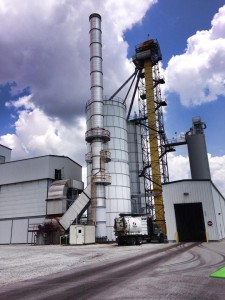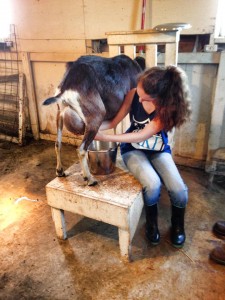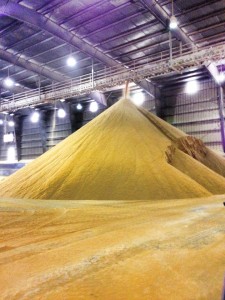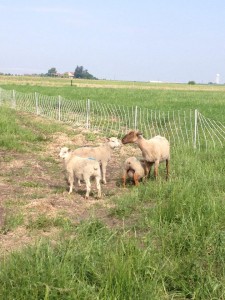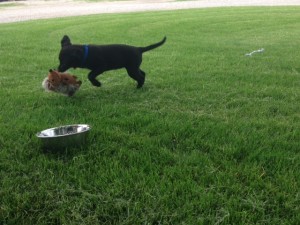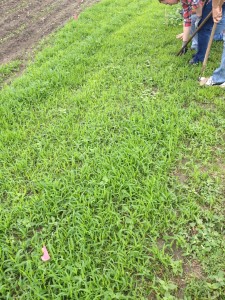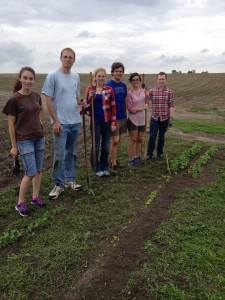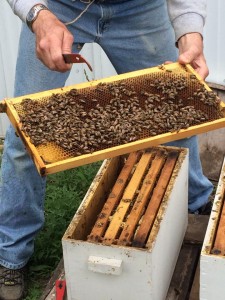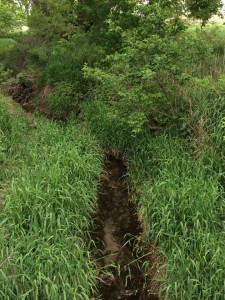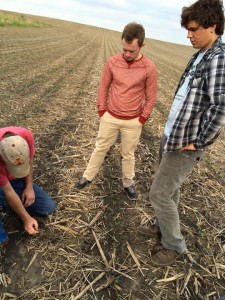Getting up early today did me no favors. I haven’t felt well all day and I’m sure that played into my reaction. As usual, I seem to take a very different viewpoint than everyone else in the group.
We first went to the Cory family farm. It was such a beautiful place with tons of animals. We got to start by milking goats. I had never had the pleasure of milking an animal before, and it was harder than it looked! Stuart and Kris went first and they had the worst time trying to figure out how to do it, so I was a little nervous. Both Hedley and I got it pretty quick, though, and I thought it was a really cool experience. I wish we had the chance to taste the milk. After that, we went to see the chickens. Even though we’ve seen multiple places with chickens, this was the first place that really stunk because of it. The contraptions that they kept the chickens in, both the broilers and the layers, were so creative! I liked their idea of moving the chickens often to let the grass regenerate.
After that, we went to the pasture where Tom keeps his sheep and cows. On the way there, he started talking about why he doesn’t vaccinate his children, which really irked me. Vaccinations have saved so many lives that I personally think it is ridiculous to not take advantage of that. More parents have decided to not vaccinate their child these days, and it is causing outbreaks of deadly diseases that haven’t been around for a long time. One of his reasons is that vaccines lead to autism. First of all, there is absolutely no scientific proof of this. Second of all, even if there were, if you would rather put your child at risk of dying of something like the measles than have to deal with a handicapped child, I think your priorities are more than a little skewed. Anyway, his pasture was gorgeous, and it was clear that he took that much pride in the maintenance of his land. I wish he would have the same respect for his animals, since it seemed to me that he saw them as merely profit. There was a sick lamb that he said he noticed was sick a long time ago. It died today and, although I’m not sure if they would have helped, antibiotics or some kind of extra attention could have saved that lamb’s life. When I asked why he chose not to do any of this, he said that the costs of saving it outweighed the costs of losing it. I believe he as an animal caretaker has a moral responsibility to take care of his animals to the best of his abilities even if it means losing money on one lamb. His idea that money was more important than trying to save an animals life immediately made me like him less.
We got back to the farm and began to work in the garden. By this point, I was very hot and didn’t feel very well. I think I would have enjoyed it more if I felt better, as I normally like garden work, but I really didn’t enjoy it. Also, the water they brought out to drink smelled and tasted like sulfur. I did not feel comfortable drinking it and it made my stomach hurt even worse. Lunch was a much needed break, but I did not feel well enough to eat much unfortunately. What I did have was very good, though. I especially liked the bread and asparagus. I noticed they ate a lot of butter, which I found ironic considering how much they stressed a healthy diet.
We finished at the Cory farm by seeing Mary’s home remedies. I know I’m biased because I’m a doctor’s daughter, but I once again found myself disagreeing with their principles. Modern medicine has come a long way and saved a lot of lives. Not going to the doctor when you or your children are sick can make it much worse and even lead to death. The story that struck me especially was Mary’s story of how they didn’t get Lorinda a tetanus shot or any medicine when she needed stitches from a dog bite. I found that to be a gamble too risky. Tetanus has no cure and terrible side effects. An infection could have very easily developed from a dog bite, especially if it was a stray dog, and I think it was a very poor decision on their part. All in all, I think it would be accurate to say that I saw the Corys as backwards and very ill-informed.
After that, we went to the ethanol plant, which I did enjoy. I was prepared for it to smell as bad as the biodiesel plant, but it really wasn’t bad at all, and I was able to concentrate. The process was much more similar to making whiskey than I had anticipated. I had expected that it would turn the corn into some unrecognizable liquid that would burn your insides if ingested. Instead, it reminded me heavily of moonshine, smell and everything. I felt like I learned a lot and our tour guide did a very good job of explaining things and showing us different perspectives without forcing one opinion on us. I definitely enjoyed the second half of the day much better than the first.
On a final note, I tried kombucha today, which is a fermented drink. I got a strawberry flavor. I liked it more than I expected, and it really tasted just like strawberry wine to me. I couldn’t get past the brown floating particles in it, though, and so I only drank a little bit. I will definitely try it again, though.

